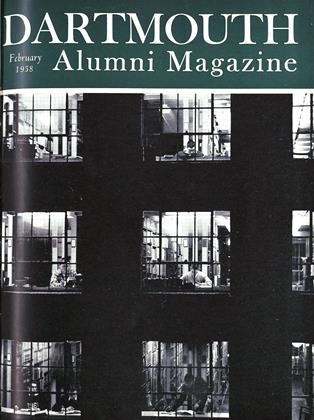By Ralph M. Wardle '31. Laxurence: University of Kansas Press, 1957. 330 PP. $5-00.
This is what they say about Oliver Goldsmith. A contemporary journalist: a "grotesque orang-outang figure"; Horace Walpole: "an inspired idiot"; Tom Davies: "an inexplicable existence in creation"; Boswell "un etourdi" [i.e., a scatter-brain]; Garrick: he "wrote like an angel" but "talked like poor Poll"; Dr. Johnson: "Let not his frailties be remembered; he was a very great man."
The twentieth century has long waited for an up-to-date and scholarly biography of Goldsmith, for the most authoritative one in two volumes by Sir James Prior was in 1957 no less than 120 years old.
The Chairman of the Department of English, University of Omaha, Professor Wardle has had the good fortune to consult at his ease the rich manuscript discoveries now at Yale University, to do research in American and foreign libraries, and to confer with leading scholars about Goldsmith, one of the most difficult persons in English literature to evaluate because of his chameleon personality, his disorganized life, and the lack of unanimity in judgments about him and his work. The problems facing a Goldsmith biographer are still knotty. What Goldsmith wrote, when he wrote it, and under what conditions are as confused as his complicated career. The men who could have untied them did not. Boswell's comments in his Life ofJohnson are biased; Dr. Percy never got around to writing Goldsmith's biography; and Dr. Johnson died before he could.
Professor Wardle suggests that no matter how glaring Goldsmith's faults: buffoonery, gambling, unscrupulous financial transactions (he cheated his own family and would sign anything to get money), drunkenness and sexual irregularities, plagiarisms, and procrastinations, his virtues are dazzling: humor, generosity, love of simple and poor people, capacity for friendships, interest in everything able to walk or crawl, and felicity in turning out effortlessly admirable prose almost undated in its subtle straightforwardness and almost limitless in its range of subject matter.
The Wardle biography will please most Dartmouth graduates with some interest in English literature of the eighteenth century. It is a lively account of "the most versatile genius of all English literature," his erratic schooling, unconventional travels, and topsyturvy career; his relations to Johnson, Boswell, Reynolds, and Garrick (to mention only four of the famous circle); and his struggles with She Stoops to Conquer and The Vicar ofWakefield (to mention only one play and his one and only novel).
Explanatory notes and the identification of Professor Wardle's scholarly sources have been judiciously relegated to the back of the book; and the curious may find there, well documented, the impressive range of researches in this country and abroad.
 View Full Issue
View Full Issue
More From This Issue
-
 Feature
FeatureWhat Makes a College New?
February 1958 By BANCROFT H. BROWN, B. P., JOHN. NASH '60 -
 Feature
FeaturePsychology at Dartmouth
February 1958 By CHARLES LEONARD STONE '17 -
 Feature
FeatureFastest Man on Skis
February 1958 By BOB ALLEN '45 -
 Feature
FeatureRegional Leaders Named for Campaign
February 1958 -
 Class Notes
Class Notes1918
February 1958 By ERNEST H. EARLEY, W. CURTIS GLOVER, RICHARD P. WHITE -
 Class Notes
Class Notes1936
February 1958 By JOHN A. SAWYER, FRANK T. WESTON
JOHN HURD '21
-
 Article
ArticleSnowed In—But Not Under
December 1947 By JOHN HURD '21 -
 Books
BooksTHE NAKED WARRIORS.
November 1956 By JOHN HURD '21 -
 Books
BooksPOLITICAL WRITERS OF THE EIGHT-EENTH-CENTURY.
MAY 1964 By JOHN HURD '21 -
 Feature
FeatureEight Graduates of Dartmouth Who Were First College Presidents
JUNE 1969 By John Hurd '21 -
 Books
BooksALL THE BEST IN BRITAIN, INCLUDING ENGLAND, WALES, SCOTLAND AND NORTHERN IRELAND, WITH ILLUSTRATIONS AND MAPS.
OCTOBER 1969 By JOHN HURD '21 -
 Books
BooksFurther Mention
MAY 1972 By JOHN HURD '21
Books
-
 Books
BooksRecommending Ken Turner '28, Magazine Subscription Agent
JUNE 1963 By CARL W. STERN '37 -
 Books
BooksTHE FRANTIC PHYSICIAN,OR THREE DRAMS OF MATRIMONIUM,
December 1935 By E. B. Watson '02 -
 Books
BooksThe Medicine Man
APRIL, 1927 By Eugene F. Clark -
 Books
BooksA CAMP AQUATIC PROGRAM,
June 1949 By Herbert F. West '22 -
 Books
BooksInfested With Sharks
June 1980 By Joseph W. Bishop Jr. ’36 -
 Books
BooksA SECOND COURSE IN COMPLEX ANALYSIS.
FEBRUARY 1968 By REESE T. PROSSER

